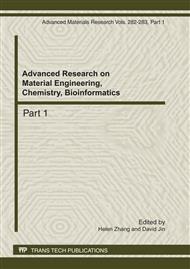[1]
T. R. Gruber: A translation approach to portable ontologies. Knowledge Acquisition. Vol. 5, (1993), pp.199-220.
Google Scholar
[2]
Rudi Studer, V. Richard Benjamins and Dieter Fensel: Knowledge Engineering: Principles and Methods. Data Knowledge. Vol. 25(1998), pp.161-197.
DOI: 10.1016/s0169-023x(97)00056-6
Google Scholar
[3]
Protégé. Available: http: /protege. stanford. edu.
Google Scholar
[4]
Sesame. http: /www. openrdf. org.
Google Scholar
[5]
KAON. http: /kaon. semanticweb. org.
Google Scholar
[6]
Dave Reynolds. Jena 2 Inference support. http: /jena. source forge. net /inference/index. html.
Google Scholar
[7]
Chang-Shing Lee, Zhi-Wei Jian and Lin-Kai Huang: A Fuzzy Ontology and Its Application to News Summarization. IEEE Transaction on Systems, Man, and Cybernetics—Part C: Cybernetics. Vol. 35(2005), pp.859-880.
DOI: 10.1109/tsmcb.2005.845032
Google Scholar
[8]
Chang-Shing Lee, Mei-Hui Wang and Hani Hagras: A Type-2 Fuzzy Ontology and Its Application to Personal Diabetic-Diet Recommendation. IEEE Transaction on Fuzzy Systems. Vol 18(2010), pp.374-395.
DOI: 10.1109/tfuzz.2010.2042454
Google Scholar
[9]
He Keqing, He Fei, Li Bin, He Yangfan and Liu Jin. Research on Service -Oriented Ontology & Meta-Modeling Theory and Methodology. Chinese Journal of Computers. Vol. 28(2005), pp.524-533.
Google Scholar
[10]
Hai Jin and Hao Wu: Semantic-enabled Specification for Web Services Agreement. International Journal of Web Services Practices. Vol 1(2005), pp.13-20.
Google Scholar
[11]
II-Woong Kim and Kyong-Ho Lee: A Model-Driven Approach for Describing Semantic Web Services: From UML to OWL-S, " IEEE Transaction on Systems, Man, and Cybernetics sPart C: Applications and Reviews, Vol. 39(2005), pp.637-646.
DOI: 10.1109/tsmcc.2009.2023798
Google Scholar
[12]
Jun Zhai, Yiduo Liang, Jiatao Jiang and Yi Yu: Ontology-based Information Retrieval for University Scientific Research Management. In Proc. 2008 Management Track within WiCOM: Engineering, Services and Knowledge. 2008, pp.1-4.
DOI: 10.1109/icinfa.2008.4608163
Google Scholar
[13]
Jun Zhai, Yan Cao, and Yan Chen: Semantic Information Retrieval Based on Fuzzy Ontology for Intelligent Transportation Systems. In Proc. 2008 IEEE SMC. 2008, pp.2321-2326.
DOI: 10.1109/icsmc.2008.4811639
Google Scholar
[14]
Jun Zhai, Lixin Shen, Yiduo Liang and Jiatao Jiang: Application of Fuzzy Ontology to Information Retrieval for Electronic Commerce. In Proc. 2008 International Symposium on Electronic Commerce and Security. 2008, pp.221-225.
DOI: 10.1109/isecs.2008.177
Google Scholar
[15]
Carmagnola, F: The five ws in user model interoperability. In Proc. 2008 UbiqUM. (2008).
Google Scholar
[16]
Stader, J. : Results of the Enterprise Project. In Proc. of the l6th Int. Conference of the British Computer Society Specialist Group on Expert Systems. (1996).
Google Scholar
[17]
Expert information system in ministry of education. http: /211. 68. 23. 118/zjk.
Google Scholar
[18]
Hunan S&T project management system. http: /61. 187. 87. 49/pms-hn.
Google Scholar
[19]
Liu Yang, Zhigang Hu and Jun Long: Service of Searching and Ranking in a Semantic-based Expert Information System. In Proc. 2010 Conferences on IEEE Asia-Pacific Services Computing. (2010).
DOI: 10.1109/apscc.2010.64
Google Scholar


